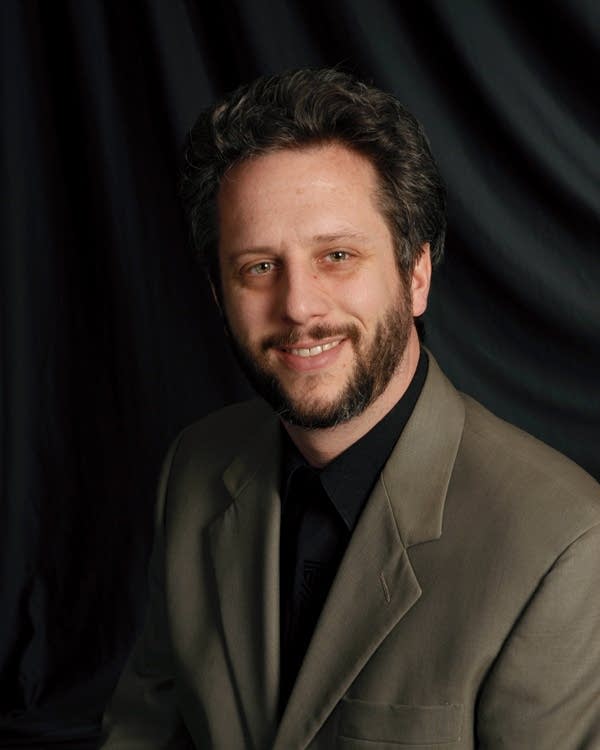
Classical MPR's new Teacher Feature highlights the lives and work of music teachers throughout Minnesota.
Brad Ollmann
General and Vocal Music Teacher
St. Anthony Park Elementary School
St. Paul, Minn.
Who or what inspired you to become a music teacher?
My mother inspired me to become a teacher. She taught for 40 years and was truly loved by her students. She was also my sixth-grade teacher.
I decided to specifically teach music while working with Professor William Day during my freshman year in college at the University of Wisconsin, Marathon County. He directed the University Choir and convinced me to become a music major.
Tell us more about your college education.
I began my studies at the University of Wisconsin, Marathon County in Wausau, Wis. It has a two-year music program with small class sizes and incredibly talented professors. I later transferred to the University of Minnesota, where I received a bachelor degree in music. About eight years ago, I received a master of arts degree in music education from the University of St. Thomas in St. Paul, Minn.
What would you say is your primary instrument?
Voice is my primary instrument, although I do have a background in piano as well.
What grade levels do you teach? Do you direct any ensembles?
I work full time teaching music to students in Kindergarten to Grade 5. Outside of that, I direct five children's choirs at Westminster Presbyterian Church in downtown Minneapolis. In spring 2014, I will go on sabbatical to direct a handful of choirs in Morelia, Mexico; not only will it be my first experience as a conductor in residence, but it will also be my first time teaching in Spanish!
In what ways do you try to encourage your students to appreciate and participate in music?
I make sure my students have many experiences in performing, creating and listening to music. In my opinion, all three aspects are crucial to a well-rounded music education.
When it comes to performing, I believe it is important that students can sing in tune and tap a steady beat. When they can clap a steady beat, I teach them to clap on the off-beat as well!
From kindergarten on, I have them compose and improvise music so they know that creating music is not something mystical that only highly trained composers do.
As far as listening, I play high-quality recordings from a wide array of genres: classical, popular and world musics, which provide them with unique aesthetic experiences as well as opportunities to discuss what they hear.
How does music education help or enhance other curricular areas? As a music teacher, even though I am most concerned with developing each student's musical aptitude, I know that some of the things we do in music class do positively impact learning in other curricular areas. For example, songs develop language acquisition, particularly for students for whom English is a second language. Singing as an ensemble or composing in a small group develops teamwork.
Research has shown that secondary students who participate in choir, band or orchestra have higher test scores than those who do not. Nevertheless, I am not convinced that current standardized tests measure overall achievement, since intangibles such as creativity, resiliency, interpersonal skills, and artistic and kinesthetic abilities are not measured by tests.
My students know that music is not always fun. Sometimes it is hard work! But the final product is the reward. Over a course of weeks or even months, a piece students are working on can be finely tuned into a performance that is magical.
If you were to host an on-air program at Classical MPR, what would be the first piece of music you'd play?
Randall Thompson's "The Testament of Freedom," a four-movement choral piece written for men's chorus and orchestra.
What is it about that piece that makes it one of your favorites?
I love how visceral and energetic it is. Thompson wrote it during World War II. The piece has a strong populist message, which I suspect provided reassurance to those who listened to it during this trying time in American history.
Nominate a music teacher for Classical MPR's Music Teacher Feature
As part of Classical MPR's educational programming, we are highlighting the lives and work of music teachers throughout Minnesota.
Is there a music teacher in your community that the Classical MPR audience should know about? Submit this form to tell Classical MPR about him or her:
You must be age 13 or older to submit any information to American Public Media Group. Any personally identifying information you provide will not be sold, shared. See American Public Media Group Terms of Use and Privacy Policy.
Love the music?
Show your support by making a gift to YourClassical.
Each day, we’re here for you with thoughtful streams that set the tone for your day – not to mention the stories and programs that inspire you to new discovery and help you explore the music you love.
YourClassical is available for free, because we are listener-supported public media. Take a moment to make your gift today.




